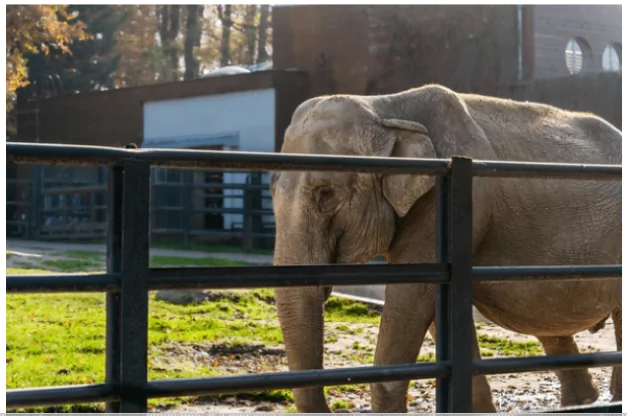Context
The government has introduced the Captive Elephant (Transfer or Transport) Rules, 2024, which ease restrictions on transferring elephants within or between states.
Captive elephants
- These elephants are tamed, not domesticated and are controlled by humans.
- Objective: The main goal of keeping these elephants is to use them for various purposes such as educational, entertainment, and work purposes.
- Captive elephants can be found at various sites like zoos, sanctuaries, circuses, and camps, etc.
|
Key provisions of the Captive Elephant (Transfer or Transport) Rules, 2024
- Liberalizes conditions for transferring captive elephants within or between states in India.
- Conditions for Transfer: It determined criteria for transfer of elephants.
- Elephants may be transferred under certain circumstances:
 When the current owner is unable to adequately care for the elephant.
When the current owner is unable to adequately care for the elephant.- When it is deemed that the elephant will receive better care elsewhere.
- When the state’s Chief Wildlife Warden determines it is necessary for the elephant’s well-being.
- The rule has outlined Health certification by veterinarians required for intra-state and inter -state transfers.
- Transfer Within State: Before transferring an elephant within the state:
- A veterinarian must certify the elephant’s health.
- The Deputy Conservator of Forests must confirm the suitability of the current and prospective habitats.
- The Chief Wildlife Warden has the authority to approve or reject the transfer based on these assessments.
- Inter-State Transfer: Similar conditions apply for transferring elephants between states:
- The elephant’s genetic profile must be registered with the Ministry of Environment, Forest and Climate Change before the transfer is initiated.
- The rule has given some Transportation Guidelines for Elephants:
- Accompanying Personnel: Elephants being transported must be accompanied by a mahout and an elephant assistant to ensure their welfare during the journey.
- Health Certification: A health certificate from a veterinary practitioner is necessary to confirm the elephant’s fitness for transport and absence of musth or infectious diseases.
- Quarantine Protocol: In cases of contagious diseases, the transfer can only proceed after completing a mandatory quarantine period recommended by the veterinary practitioner.
- Pre-Loading Care: Elephants must be adequately fed and provided with water before loading onto transport vehicles to ensure their well-being.
- On-Route Provisions: Provision of food and water must be ensured throughout the journey to meet the elephants’ nutritional and hydration needs.
- Tranquilization Protocol: Tranquilizers or sedatives may be administered by a veterinary practitioner if elephants exhibit nervous or temperamental behavior, ensuring their safe transportation.
Wildlife Protection Act: Trade and Transfer in Elephants
-
- Until August 2022, the Wildlife Protection Act strictly prohibited the trade in wildlife, including both wild and captive elephants.
-
Introduction of Exemption Clause:
-
- Amendments to the Act introduced an exemption clause, permitting the transfer of captive elephants for the first time.
-
Parliamentary Committee Recommendations:
-
- Parliamentary Committee, chaired by Congress Rajya Sabha MP Jairam Ramesh, recommended the removal of this exemption clause, except for elephants owned by temple trusts, advocating for a balance between tradition and conservation.
-
Final Legislation:
- Despite recommendations, the amended act allowed the movement of captive elephants.
- However, only elephants with an existing certificate of ownership are eligible for transfer.
| The Wild Life (Protection) Act, 1972 : Earlier, this act was responsible for safeguarding all wild animals, their habitats, management, and regulation of their trade.
Wildlife Protection Act amended 2022: The Wild Life (Protection) Act, 1972 was amended in 2022.
- The law sets rules to safeguard different kinds of wild animals and their habitats.
- It also outlines guidelines for managing these habitats.
- Additionally, it regulates and oversees the trade of products made from various parts of wild animals.
|
Impacts of Amendments Made to the Wildlife Protection Act Regarding Captive Elephant Transfers
The amendments to the Wildlife Protection Act aimed to balance the welfare of captive elephants with the preservation of cultural practices.
-
Enhancing Elephant Care:
- Better care and well-being: The amendments acknowledge that transferring some captive elephants to suitable habitats can lead to better care and well-being.
- Enhance the living conditions: The Act intends to enhance the living conditions of these elephants by facilitating transfers.
-
Addressing Management Challenges:
- Space, nutrition, and health: Captive elephants often encounter challenges related to space, nutrition, and health. The transfer of elephants will mitigate these problems.
- Smooth relocation of elephants: The amendments establish a legal framework for responsible transfers, ensuring smooth relocation of elephants under specific conditions and with appropriate oversight.
-
Enhanced Conservation of Genetic Diversity:
- It promotes traceability and preserves genetic diversity: Registering the genetic profile of elephants before transfer promotes traceability and preserves genetic diversity.
- This measure contributes to the long-term conservation of elephant populations.
-
Recognition of Cultural and Religious Practices:
- While conservation efforts are paramount, the Act recognizes the cultural and religious importance of elephants in India.
- Temple trusts, often custodians of captive elephants, are exempt from transfer provisions.
-
Balancing Tradition and Conservation:
-
- Amendments strive to maintain cultural practices while ensuring the welfare of captive elephants.
Also Read: Amendments In Wildlife Trade Rules
News Source: The Hindu
![]() 19 Mar 2024
19 Mar 2024
 When the current owner is unable to adequately care for the elephant.
When the current owner is unable to adequately care for the elephant.